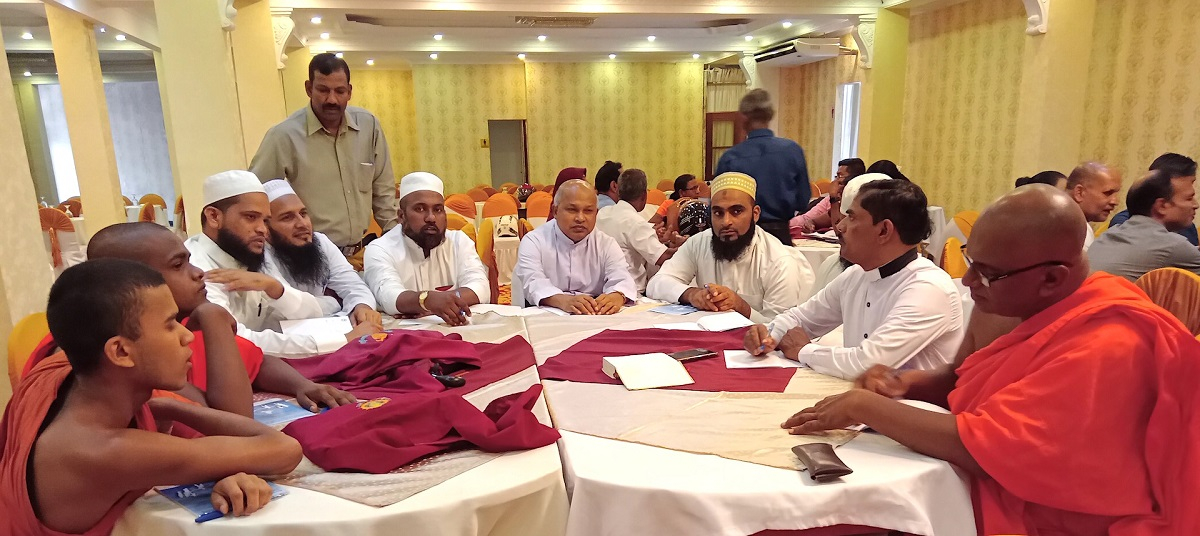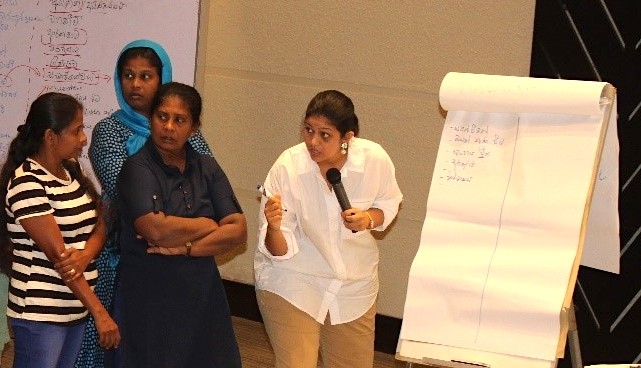The CSO Collective held a meeting to discuss the deteriorating conditions in the country in which hardships of the people continue to grow along with governmental suppression of dissent. NPC was one of the core group of organizers. More than 500 leading civic activists from across the country attended the meeting. NPC took on the task of ensuring participation by clergy from all religions by facilitating the attendance of 68 religious clergy from its 17 District Inter Religious Committees as well as 25 youth and seven coordinators from its Local Inter Religious Committees. In addition, 24 representatives from NPC's partner CSOs at the district and divisional levels also attended.
News
A key feature in any democracy is the right to information. In Sri Lanka, the right to information is ensured through Article 14(1)(A) of the Constitution to all the citizens. It is subject to certain limitations prescribed in the legislation such as unwanted intrusion into the privacy and national security.
On the final phase of the project for government officers of the Office on Missing Persons (OMP), funded by the Canada Fund for Local Initiatives (CLFI), four training programmes were held in Matara, Jaffna, Mannar and Batticaloa. Understanding the theoretical and practical concepts of pluralism and inclusivity, transitional justice, non-violent-communication and empathy aimed at bridging the gaps identified in earlier activities.
NPC, with the assistance of its partner organizations, held five district level NGO networking meetings in the districts of Kurunegala, Batticaloa, Mannar, Monaragala and Beruwala, attended by 150 NGOs working on social and development issues.
Strengthening DIRCs through developing their strategic and communications plans was the focus for meetings held in Hambantota, Kurunegala, Kegalle, Kandy, Puttalam, Galle, Matara, Ratnapura, Badulla, Nuwara Eliya, Vavuniya, Anuradhapura, Polonnaruwa, Batticaloa, Jaffna and Monaragala under NPC’s Plural Action for Conflict Transformation (PACT) project. “As a manager for Sanasa, I have received training on preparing strategic plans but today I was able to get a clear understanding of the process. I think we can follow this method for any activity we do.
Do you secure you digital devices like your door at home? Do you use either a laptop, computer, mobile phone or portable storage devices? If yes, you are well protected. If not, this opens up avenues for potential threats, loss of sensitive and confidential data affecting both you as individuals and as an organisation.
Training programmes on non-violent communication, non-violent movements and citizen activism were held under NPC’s Women Organized for Inclusion through Community Engagement (WOICE) project. The role of women in leadership positions has gained significant recognition across various sectors. As women continue to break barriers and assume positions of power and influence, it becomes crucial to equip them with the necessary tools and skills to promote peace and harmony in their communities.
Jaffna is governed under one of three remaining customary laws used in Sri Lanka: Thesawalamai law, which is the traditional law of the Sri Lankan Tamil inhabitants Jaffna peninsula, codified by the Dutch during their colonial rule in 1707.

NPC, with the assistance of its partner organizations, conducted networking meetings in the districts of Ampara, Matara, Badulla, Kandy, Rakwana, Negombo, Trincomalee and Vavuniya. The way subnational NGOs interacted with multiple religious leaders at the meeting revealed gaps in their pluralism capacity. For example, they gave more attention and respect to the majority religious leaders in comparison to minority religious leaders.
The Jaffna District Inter Religious Committee (DIRC), with the guidance of its partner organization SOND, organised a peace march followed by a media conference. These were to highlight the growth in religious tension, request restraint on the part of all religions and to urge the government to prevent escalation.
When asked whether he thought the Office on Missing Persons (OMP) had done anything constructive for victim families or if it would do so, a former OMP official at an event organised by NPC was not optimistic. The official was attending one of the six review meetings held in Mannar, Batticaloa and Jaffna under the Canada Fund for Local Initiatives (CLFI)/OMP project at a regional level to assess the effectiveness and efficiency of OMP services received by the families of victims. The willingness of the new OMP leadership to collaborate with CSOs in improving their service is a positive indication of a new start.
The Advanced Certificate Course on sustainable peace through pluralism and inclusive service delivery was launched at the University of Ruhuna. As part of the Freedom House project, the course will introduce a new dimension to the university in supporting the public sector to improve the effectiveness and efficiency.
Saman Seneviratne, NPC’s Project Manager, is leaving the organization after two decades of dedicated and tireless service to the grassroots communities that NPC is engaged with. “NPC has come a long way since I accompanied Saman who was taking the lead to set up District Inter Religious Committees in places and towns I had never been to before. Some of those meetings were small with disempowered participants who did not know us and we did not know them. I saw the enormity of the challenge. Today when we go to those areas we are well recognised and those who attend our programmes are more empowered,” said NPC’s Executive Director Dr. Jehan Perera.
As Director of the Social and Economic Development Centre (SEDEC) in 1993, Fr. Oswald Firth encouraged spiritual leaders in Sri Lanka to play a bridge building role calling for peace and reconciliation and to commit themselves to sustained efforts, sacrifice and solidarity to create an atmosphere of trust, confidence and freedom to build a future based on the values of justice, human dignity and mutual respect.
As in 16 other districts throughout the country, the Kandy District Inter Religious Committee (DIRC) meets regularly. The committee represents a common voice across all religions. While one channel of communications is media or press statements by religious leaders on provincial level, it is also a meeting platform for collective thought of all committee members including CBO and CSO representatives.
A country that is rich in diverse ethnicities and religions requires a democratic governing system that ensures a plural society, meaning a living in a shared space while respecting each other’s diversity.










